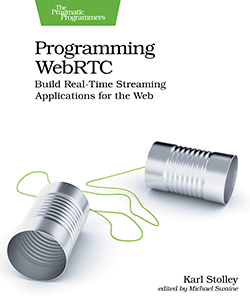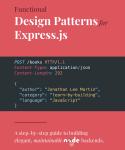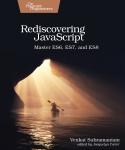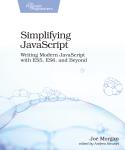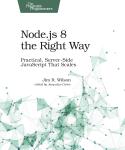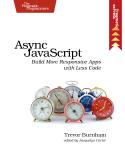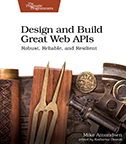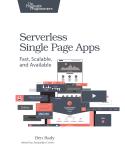About This Title
Pages: 266
Published: June 2024
ISBN: 9781680509038
In Print

Programming WebRTC
Build Real-Time Streaming Applications for the Web
by Karl Stolley
Build your own video chat application—but that’s just the beginning. With WebRTC, you’ll create real-time applications to stream any kind of user media and data directly from one browser to another, all built on familiar HTML, CSS, and JavaScript. Power real-time activities like text-based chats, secure peer-to-peer file transfers, collaborative brainstorming sessions—even multiplayer gaming. And you’re not limited to two connected users: an entire chapter of the book is devoted to engineering multipeer WebRTC apps that let groups of people communicate in real time. You’ll create your own video conferencing app. It’s all here.
eBook Formats:
PDF for desktop/tablets
epub for Apple Books, e-readers
mobi for Kindle readers
Get all eBook formats here for $30.95 (USD)
Paperback Formats:
Order via Bookshop (U.S. Only)
Please support indie bookstores!
Find indie bookstores in the U.S. Find indie bookstores around the world.
WebRTC is an API exposed in all modern web browsers. After almost a decade of development, the WebRTC specification was finalized, and this book provides faithful coverage of that finalized specification. You’ll start by building a basic but complete WebRTC application for video chatting. Chapter by chapter, you’ll refine that app and its core logic to spin up new and exciting WebRTC-powered apps that will have your users sharing all manner of data with one another, all in real time. No third-party libraries or heavy downloads are required for you or your users: you’ll be writing and strengthening your knowledge of vanilla JavaScript and native browser APIs.
You’ll learn how to directly connect multiple browsers over the open internet using a signaling channel. You will gain familiarity with a whole set of Web APIs whose features bring WebRTC to life: requesting access to users’ cameras and microphones; accessing and manipulating arbitrary user files, right in the browser; and web storage for persisting shared data over the life of a WebRTC call. Like any Web API, WebRTC doesn’t enjoy a perfect implementation in any browser. But this book will guide you in writing elegant code to the specification, with backward-compatible fallback code for use in almost all modern browsers.
Use WebRTC to build the next generation of web applications that stream media and data in real time, directly from one user to another—all by working in the browser.
What You Need
Readers need a text editor, an up-to-date copy of Chrome or Firefox, and a POSIX-style command-line shell. They’ll also need to install a little bit of open-source software, especially Node.js. All necessary setup is covered in full in the book’s introductory chapter.Resources
Releases:
- P1.0 2024/07/01
- B10.0 2024/06/17
- B1.0 2024/06/17
- B9.0 2024/04/10
Contents & Extracts
- Preface

- Your WebRTC Journey
- Who Should Read This Book?
- What’s Covered (And What’s Not)
- How This Book Is Organized
- Online Resources
- Preparing a WebRTC Development Environment
- Installing Node.js
- Downloading the Supporting Code and Installing Dependencies
- Serving HTTPS in Development
- Choosing a Development Browser
- Starting and Stopping the Server
- Working with a Signaling Channel
- Preparing a Basic Peer-to-Peer Interface
- Adding Video Elements: Self and Peer
- Styling the Core App Elements
- Adding Functionality to the Call Button in JavaScript
- Positioning WebRTC as a Front-End Technology
- Using a Lightweight Signaling
Channel

- Connecting to the Signaling Channel
- Establishing a Peer-to-Peer Connection
- Requesting User-Media Permissions
- Setting Up the Peer
Connection

- Building Connection Logic to the “Perfect Negotiation” Pattern
- Receiving Media Tracks
- Testing Out Your First Peer-to-Peer App
- Handling Data Channels
- Adding Basic Visual Effects to User Videos
- Determining Peer-Connection States
- Applying Filters Remotely with Data Channels
- Uniquely Identifying Data Channels
- Adding a Text-Chat Feature
- Adding Logic to Handle Chat Events
- Setting Up the Text-Chat Data Channel
- Building a Message Queue
- Streaming Complex Data
- Structuring Chat Messages in
JSON

- Adding Mic and Camera Toggles
- Refining the Initial Properties on Self and Peer
- Building A/V Toggles
- Sharing Features over Data Channels
- Sending Images over the Chat
- Sending and Receiving Binary Data
- Structuring Chat Messages in
JSON
- Managing Multipeer Connections
- Learning from a Failed Peer-to-Peer Call
- Working with a Multipeer-Ready Signaling Channel
- Revising the Signaling Logic on the Client
- Generating Video Structures on the Fly
- Initializing Peers as Needed
- Fleshing out the Skeletal Signaling Callbacks
- Working with Peer IDs in the handleScSignal() Callback
- Restructuring WebRTC Callbacks with
Closures

- Sharing Features over Multipeer Data Channels
- Managing User Media
- Determining Device Availability
- Detecting Device Changes
- Removing User Media for Remote Peers
- Programmatically Recognizing Denied Media Permissions
- Setting and Applying Media Constraints Objects
- Deploying WebRTC Apps to Production
- Configuring a WebRTC App for Public Deployment
- Configuring a Server to Host Your WebRTC App
- Deploying Your App with Git
- Monitoring Your App with PM2
- Configuring Nginx for Reverse Proxies
- Setting Up Your Own STUN/TURN Server
- Connection Negotiation in Legacy Browsers
- Implementing Backward-Compatible Fixes
Author
Karl Stolley has been practicing, researching, and writing about web development up and down the stack since the blink tag was still a thing. Formerly a tenured university professor, he’s a frequent speaker at national and international conferences, and a routine presenter and participant in professional developer groups and meetups in Chicago.eBook Formats:
PDF for desktop/tablets
epub for Apple Books, e-readers
mobi for Kindle readers
Get all eBook formats here for $30.95 (USD)
Paperback Formats:
Order via Bookshop (U.S. Only)
Please support indie bookstores!
Find indie bookstores in the U.S. Find indie bookstores around the world.
Related Titles:

About This Title
Pages: 266
Published: June 2024
ISBN: 9781680509038
Edition: 1
In Print
